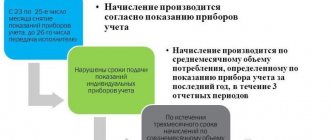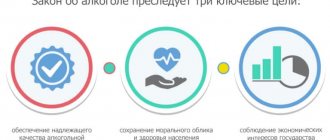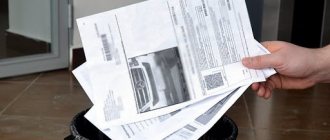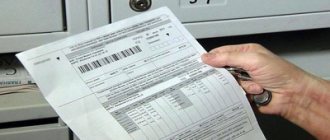The procedure for calculating penalties for utilities
Penalties are penalties for violations of the procedure for paying utility bills and paying contributions for major repairs. The obligation to pay them occurs in two cases:
- late payment
- payment not in full
Payment of penalties is carried out in the same manner both for payment for premises and utilities, and for contributions for major repairs. The only difference is their size.
The amount of the penalty is one three-hundredth (1/300) or one hundred-thirtieth (1/130) of the refinancing rate of the Central Bank of the Russian Federation of the unpaid amount in effect on the day of payment. Considering that the refinancing rate has no independent meaning and is equal to the key rate, it would be correct to consider the penalty as one three hundredth of the key rate.
| Penalty amount for payment for housing and utilities | ||
| First 90 days of late payment | From 90 days of delay | |
| Penalty amount | 1/300 key rate | 1/130 key rate |
| Amount of penalty for making a contribution for major repairs | ||
| Penalty amount | Fixed – 1/300 of the key rate | |
Penalties begin to accrue from the 31st day of late payment.
Moreover, their size cannot be more than 1/130 of the key rate of the amount unpaid on time for each day of delay.
More ways to cut your rent
In addition to ways to reduce payments for housing and communal services, remove or reduce penalties, there are mechanisms that make payments easier for the family. This category may include benefits, installment plans or recourse to payment.
Some citizens are entitled to government support in the form of benefits and utility subsidies. To use them, you must be debt-free when the subsidy decision is made. If this cannot be done, it is worth at least having a debt restructuring agreement in hand. There is one more condition. Family expenses for housing and communal services at regional tariffs should be higher than the total expenses that a family can afford at the existing level of income.
Warning
For some categories, a 50% reduction in rent is provided - these are veterans, disabled people, families with three or more children.
A mechanism such as installments makes it possible to repay the debt in a mode that is comfortable for the payer. The debtor submits an application for the provision of such a service, and the amount is paid not as a lump sum, but in installments. It must be remembered that the service organization is capable, but not obligated, to take such a measure.
Regression of payment - if the tenant or the owner of the property has paid off the utility debt along with penalties (based on a court verdict), then he receives the right to compensate for a share of the funds spent at the expense of other persons registered in the apartment.
Is it possible not to pay penalties for utilities?
The obligation of citizens and organizations to pay for utilities is established by law.
If you do not make payments on time or not in full, a debt will accumulate, which can be collected in court. At the same time, the procedure for collecting debts for utility services is quite simple - the court issues a court order.
During the period of coronavirus restrictive measures, there is a widespread opinion among citizens that it is possible not to pay utility bills. This is not true. The obligation to pay for housing, utilities and major repairs remains.
Utility service providers do not have the right to demand payment of penalties (penalties) until 01/01/2021. The same rule applies to contributions for major repairs.
Thus, due to the current situation and coronavirus restrictive measures, until January 1, 2021, you do not have to pay penalties.
At the same time, the Supreme Court clarified that this right applies to debt that has arisen since April 6, 2021.
USEFUL : if you have an illegal penalty included in your receipt, feel free to request a recalculation, watch the video in what order to do this
Rent reduction when tenants are away
Frequently traveling citizens have a question about whether it is necessary to pay penalties accrued during the period of departure, when no one lived in the apartment. Arguments are given about the non-use of electricity, water, and gas in such cases. However, there are items for which even absent residents need to be paid - these are general house needs and heating.
It will not be possible to stop the accrual of payments for other resources automatically. To do this you will need to complete some documents:
- application for recalculation - such a document must be submitted to the service organization no later than 30 days after return or before departure. Payment amounts may be reduced for a period of 6 months. If this time is not enough, you will have to repeat the application;
- papers confirming the fact, reason and time of absence (copies or scans of tickets, travel certificate, etc.).
Attention
It makes sense to collect such documentation if the period of expected absence is more than five days (utility payments are not recalculated for less time). These five days should not include departure and arrival days.
Collection of penalties for utilities
Penalties for utilities are usually collected along with the amount of the principal debt.
To collect penalties, utility service providers or another authorized organization with which an agency agreement has been concluded applies to the court with an application for a court order or with a statement of claim in summary proceedings. A calculation of the amount of claims, the basis for such calculation (agreement) and a calculation of the amount of penalties are provided.
The court order issued by the court is sent for execution to the FSSP, where measures will be taken to search for the debtor and foreclose on his property in the event of non-payment of the debt amount voluntarily.
Reduction of part of the penalty
Penalties cannot be accrued if the rent debt for a particular period is partially reimbursed. For example, a tenant has not paid for 8 months, but he paid the receipt for some of them. Not only penalties for this month are deducted - the entire penalty from the moment the funds are deposited must be recalculated, since the interest rate changes.
Information
The size of the penalty can be reduced by using Art. 333 Civil Code. But this requires resolving the dispute in court: only the court issues an opinion on the application of the rule of proportionality between the penalty and the rent debt.
Statute of limitations for penalties for utilities
The utility service provider may demand payment of penalties throughout the entire term of the contract and beyond in case of debt.
Another thing is that this debt can be collected within three years (3 years) . In this case, three years are calculated separately for each monthly payment. The statute of limitations for collecting penalties for utilities expires when the statute of limitations for collecting the principal amount of the utility payment, for the delay of which penalties were accrued, expires.
Protection of rights in the judicial and law enforcement systems
In any case, when a payment user suspects a supplier of illegally imposing a fine, you can signal the local prosecutor's office and file a lawsuit to cancel the illegal payments.
Contacting the prosecutor's office
It is issued in the form of a simple application. The structure of the document is standard - introduction or “header”, main part, date and personal signature of the applicant, list of attachments. The text must indicate what exactly the violation of the law by the creditor is, for example, deliberately inflating the penalty or negligent attitude towards the performance of official functions.
The appeal will be taken into account and the actions of utility workers will be checked. If the fact of deliberate disregard of counting rules or other illegal acts comes to light, then interest for delays in payments may be canceled.
Legal proceedings
It makes sense to contact a judicial authority in two situations:
- for complete cancellation of penalties;
- for partial write-off or restructuring.
The plaintiff must prove to the court the validity of his claims. Servants of Themis will consider the case, study the materials and come to a definite decision. The subject has the right to refer to valid reasons that actually prevented the subscriber from paying housing and communal services on time. The list of possible mitigating circumstances includes:
- natural disasters, riots, other force majeure;
- serious health condition, long stay in hospital for treatment;
- errors in calculations made by the management company or RSO;
- long absence from the place of residence.
Important! The petition of claim is drawn up according to the rules of Art. 131 Code of Civil Procedure of the Russian Federation. As a general rule, a claim must be filed at the location of the defendant.
Samples of a claim and application to the Criminal Code and the prosecutor’s office to cancel the fine for residential complex services can be downloaded from the following links:
Example of a claim.
Sample application to the Criminal Code.
Sample application to the prosecutor.
Application for write-off of fines on rent
The utility service provider may decide to write off penalties. There may be legal grounds for this or an agreement with the utility organization (agreement).
An application can be written in the following cases:
- The statute of limitations for obligations has expired
- Debtor's bankruptcy
- Purpose of restructuring (agreement with a utility company on debt repayment)
- Private, personal reasons that prevented the fulfillment of the obligation to pay for utilities - illness, disaster, etc.
- Disproportionality of penalties to the amount of debt
- Incorrect calculation of penalties
- Based on the above reasons, the penalty can be written off in whole or in part.
- Suspension of accrual of penalties for utilities
- During the period of coronavirus restrictive measures introduced throughout Russia, a Government Resolution banning the collection of penalties for utilities and major repairs came into force.
NOTE : also read additional tips on installment payments for utilities via the link on our website
Cancellation of penalties in bankruptcy
An individual declares himself bankrupt - this will serve as a reason to cancel the entire amount of the rent debt along with penalties. After all, bankruptcy means a person’s inability to pay debts.
You can completely remove utility penalties:
- if at least 3 months have passed since the onset of insolvency;
- if the total debts of an individual exceed the threshold of 500 thousand rubles. (this is not only unpaid housing and communal services receipts, but also overdue loans and other debts).
Of course, large penalties for utilities are not a reason to declare bankruptcy. This procedure takes a long time, requires a lot of effort and certain financial expenses. In addition, we are not talking about simply liquidating the bankrupt’s debts - they are partially paid off with money received from the sale of all the debtor’s property. Only a single apartment or plots of land cannot be taken away and sold.
Reducing penalties for utility bills through court proceedings
As a general rule, if no attempts are made to reduce the penalty for utilities, then the court will, of course, take as a basis the calculation provided by the plaintiff. Therefore, I recommend filing a petition to reduce the amount with justification for the objection under Art. 333 of the Civil Code of the Russian Federation (more details at the link).
In such cases, according to established judicial practice, there should be a comparison of the accrued penalty with the amount of debt, when it is clearly disproportionate to the violated obligation - it is necessary to review the accrued penalties in the direction of reducing utility bills, in particular, a good example in the form of the Moscow City Court’s Ruling dated 05/06/2016 serves as confirmation in case No. 4g-4416/2016.
Other reasons for reducing penalties for utility services include:
- Other noteworthy circumstances of the case under consideration, for example, incorrect calculation of the initially indicated amounts, which led to a dispute (payments to the reserve fund for major repairs, fees for the maintenance of the common property of the house, etc.)
- Penalties should not be collected for the first month, such are the new rules for calculating fines for this category of cases
- If the defendant did not receive information about his debt, for example, the order of delivery of receipts was violated, there was no written requirement to repay the debt in the receipts provided, then all this should be used when deciding whether to reduce the amount of the penalty for a communal apartment
In addition, be sure to analyze the claim of your management company for the limitation period, because if penalties are accrued on the amount of debt outside the three-year limitation period, then you have every reason to demand that these accruals be excluded completely from the calculation of claims.
Why don’t utility companies voluntarily reduce or remove penalties if a person cannot get out of housing and communal services debt?
Everyone can find themselves in a difficult situation when various events occur in life: loss of a job, illness of a utility payer or their close relatives.
Of course, in such cases there is no time for payments that are not paramount. The question of how to avoid paying penalties for rent is the first thing that comes to mind. But the law is the law, even if it is sometimes unfair in relation to a particular citizen...
If utility companies cancel penalties without trial:
- Other residents will suffer, because they pay in good faith, and the negative consequences of delays and losses of managers, in connection with this, may hit their wallets
- Writing off penalties on rent by the head of an HOA or housing cooperative may turn against the chairman, against whom residents and employees may complain that he is reducing revenues by such actions, has entered into a conspiracy, etc.
That is why it is possible to solve the problem of reducing utility services only in court through Article 333 of the Civil Code of the Russian Federation.
When is it possible to reduce or write off a penalty?
For this purpose, particular and general grounds are taken into account. Part of the penalty or its full amount may be written off. General grounds have a broader effect and can lead to the cancellation of both penalties and utility debts in general.
These reasons will be:
- death of a debtor tenant, as well as liquidation of a legal entity that received utility bills;
- lapse of time;
- declaring the debtor (individual) bankrupt;
- the inability of bailiffs to implement a court decision in practice.
Private grounds for not collecting rent penalties:
- the debtor's statement about unforeseen life situations (long-term disability, departure, etc.); in court, as a rule, difficult circumstances in the lives of citizens are taken into account;
- installment payment of debt;
- reduction of penalties due to disproportion to the main utility debt (such a right is provided for in Article 333 of the Civil Code);
- availability of payment recourse.










